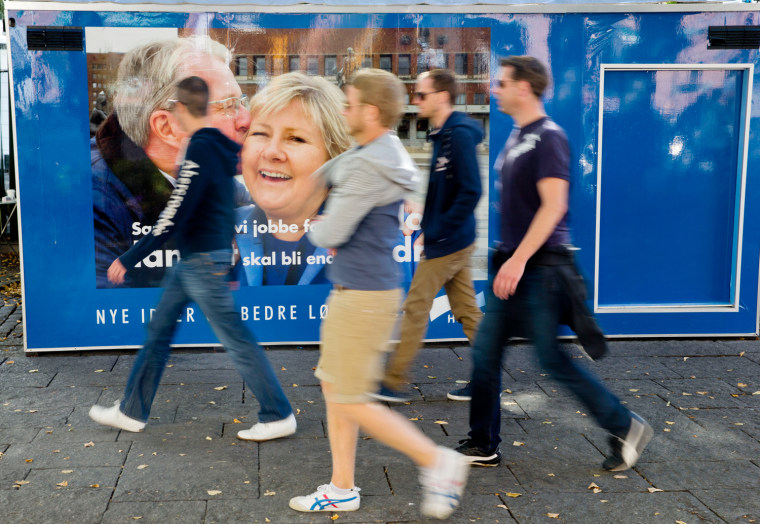Just two years after Anders Behring Breivik killed 77 people in Oslo and on the island of Utøya, the anti-immigration party he used to support could be voted into Norway’s government on Monday.
Polls have predicted the right-wing Progress Party could win as many as one in seven votes. This would put it in prime position to become junior coalition partners with the Conservative Party -- led by Erna Solberg, nicknamed “Iron Erna” -- which is predicted to sweep Prime Minister Jens Stoltenberg’s Labor Party out of power.
A forecast by Statistics Norway, based on a quarter of the vote after polls closed Monday, indicated Conservative Party leader Solberg would become the prime minister, replacing Stoltenberg, The Associated Press reported.
The new right coalition – with a forecast 52.8 percent of the votes -- is expected to include the Progress Party, the Liberal Party and the Christian Democrats, according to the AP. The precise number of parliamentary seats won by the minority parties has yet to be reported.
Dozens of survivors of Breivik's massacre on Utøya island on July 22, 2011, mostly members of the Labor Party youth wing, are seeking office in the national election.
But the wave of sympathy for the Labor Party in the wake of the shooting spree seems to have evaporated and the Norwegian public seems ready for a new government after eight years.
Vegard Wennesland was among some 650 people on Utøya that day and is running for election as a Labor candidate in Monday’s vote. But he said that while he disagrees with the views of the anti-immigration Progress Party, he sees no connection between the party and Breivik.
“My decision to run does not have anything to do with the actions of two years ago, but it is to do with [the Progress Party's] attitude towards immigration,” he told NBC News. “I have always been politically active, but that day reaffirmed my politics and reaffirmed what I knew was the right thing to do.
“Someone tried to kill me because of what I believed in. He did that because he saw that was the best way to meet the challenge that politics presented to him. That reaffirmed my motivation to [participate in] democracy.”
Breivik was once a member of the Progress Party, but left in disillusionment with the democratic process as a whole.
Kjetil Kolsrud, news editor of Olso newspaper Aftenposten, said that while the vote signifies a shift to the right for Norway, Breivik is not part of the political debate.
“The Progress Party has no link to what Breivik did. It is not a relevant issue,” he said. “No Norwegian with a minimum of insight would connect Breivik to the Progress Party today.”
The beliefs of the centrist Conservatives are rooted in what Kolsrud calls Scandinavian liberal traditions, while the Progress Party “would indicate a shift to right." But he added that "on the other hand, such a coalition inevitably will push the Progress Party towards the center, or such coalition will not last.”
Voters want to punish Prime Minister Jens Stoltenberg for wasting Norway’s flourishing offshore oil sector which has boosted per capita GDP to $100,000, according to a Reuters report in the election run-up.
The Labor Party could emerge the biggest party with 30 percent of the vote, Reuters said citing opinion polls, but that will not be enough.
This swing to the right is illustrated by the policies of the Progress Party, rejected by the political consensus a decade ago, being widely accepted now, according to Professor Knut Heidar, of Oslo University’s Department of Political Science.
“The policies which [Progress] were proposing 10 years ago are now being accepted by all the parties, including Labor, in terms of integration, that immigrants should learn Norwegian and so on," said Heidar.
Wennesland however remains optimistic. "I hope that the Labor Party not only wins, but does so with such a majority that we can lead the people, and I get a chance to do things for young people."
Reuters contributed to this report.
Related:
